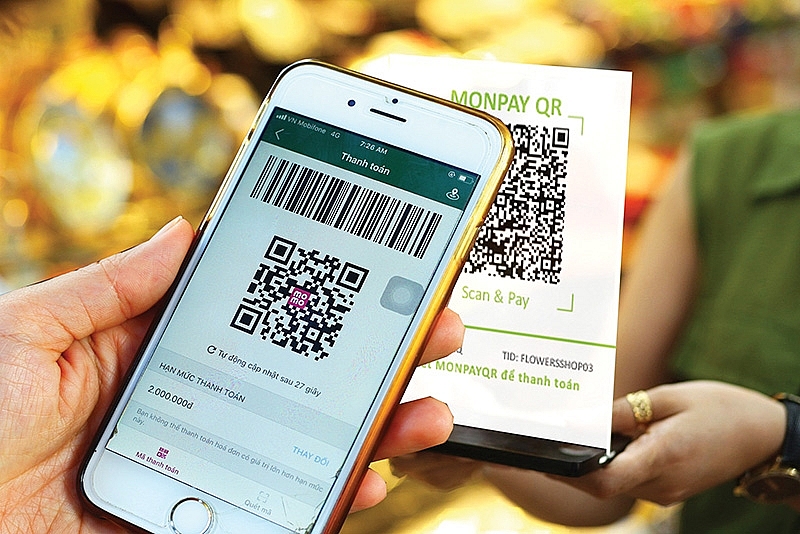Going cashless with new mobile money solutions
 |
| Going cashless with new mobile money solutions |
A draft decision on implementing mobile money in Vietnam is slated to be submitted to the prime minister soon. Experts are optimistic about how mobile money may transform the landscape of financial inclusion, leapfrogging the provision of formal banking services.
Tran Duy Hai, deputy director at Department of Telecommunications under the Ministry of Information and Communications, emphasised that mobile money will enable quicker money transfers, without even having to set foot in brick-and-mortar banks.
Notably, two state-owned technology conglomerates VNPT and Viettel have been licensed by the State Bank of Vietnam (SBV) to implement mobile money services. A national personal database has also been built for issuing personal identification numbers, as well as adopting e-KYC (electronic Know-Your-Customer).
Viettel has prepared the groundwork for launching a pilot scheme thanks to its strong network nationwide: 60 million mobile subscribers, more than 2,600 stores, post offices, supermarkets, more than 270,000 points of sale (POS), and more than 30,000 employees ranging from every corner of the country.
“Mobile money will reach new heights if local authorities approve small-sized financial transactions for purchasing goods and services. In fact, the number of banks pale in comparison with that of mobile-related agencies across the country,” said Pham Trung Kien, CEO of Viettel Digital.
Meanwhile, MobiFone has followed suit by submitting its plan to deploy mobile money and now is waiting for approval from the SBV.
“The sooner SBV allows us to deliver this payment approach, the sooner substantial growth of m-payments in Vietnam will arrive,” a MobiFone representative said.
Nguyen Nam Thang, deputy director of Fintech Centre at VNPT revealed the group currently has more than 100,000 POS across the country, paving the way for adopting this kind of product seamlessly. VNPT has also signalled its intention to partner with e-commerce or logistic firms to build an efficient ecosystem.
“We believe mobile money will tap into the local rural market, as well as equip more clients who live in underdeveloped infrastructures, or those who are unbanked. It is also expected to be a boon for the agricultural value chain,” said Thang. “The new payment method would make it cheaper and faster to grant or repay loans, and widen access to financial services for those without formal credit history.”
There are now more than a billion registered accounts globally, with almost $2 billion being transacted a day on average, and for the first time digital transactions represented the majority of mobile money interactions. Market watchdogs also state that this service could facilitate transactions, enable savings, credit products, and even simplify taxation for governments – all at scale and much faster than traditional financial networks.
Experts at BIDV Training and Research Institute believe mobile money boasts immense potential thanks to a wide range of users. At the end of 2019, there were 129.5 million mobile subscribers nationwide, of which nearly half were 3G and 4G. The country also had 43.7 million smartphone users, or 45 per cent of the country’s population in 2019, together with 68.5 million internet users.
In addition, the SBV’s statistics showed about 63 per cent of citizens from the age of 15 or higher were unbanked – they could become the target audiences.
Market research firm Statista found that Vietnam’s total transaction value in the digital payments sector amounted to $8.52 billion in 2019. Total transaction value is expected to show a compound annual growth rate of 12.7 per cent between 2019 and 2023, resulting in a total value of $13.7 billion by 2023.
All signs are pointing to Vietnam’s potential to implement this payment method. Meanwhile, financial services are to be fostered in rural and remote areas through the development of new and modern means of payment, which will further help Vietnam to achieve financial inclusion.
As Vietnam heads towards a cashless economy, the adoption of mobile money and an adequate regulatory framework is getting extra support from the government. Minister of Information and Communications Nguyen Manh Hung has also encouraged financial inclusion, saying that the application of mobile money could generate economic growth of up to 0.5 per cent for the country.
According to the 2019 State of the Industry Report on Mobile Money by the Global System for Mobile Communications Association, digital transactions represented the majority of mobile money flow. For every 100,000 adults in today’s world, there are 11 banks, 33 ATMs, and 228 mobile money agents and services available in 96 per cent of countries where less than a third of the population has an account at a formal financial institution.
What the stars mean:
★ Poor ★ ★ Promising ★★★ Good ★★★★ Very good ★★★★★ Exceptional
Related Contents
Latest News
More News
- VNPAY and NAPAS deepen cooperation on digital payments (February 11, 2026 | 18:21)
- Vietnam financial markets on the rise amid tailwinds (February 11, 2026 | 11:41)
- New tax incentives to benefit startups and SMEs (February 09, 2026 | 17:27)
- VIFC launches aviation finance hub to tap regional market growth (February 06, 2026 | 13:27)
- Vietnam records solid FDI performance in January (February 05, 2026 | 17:11)
- Manufacturing growth remains solid in early 2026 (February 02, 2026 | 15:28)
- EU and Vietnam elevate relations to a comprehensive strategic partnership (January 29, 2026 | 15:22)
- Vietnam to lead trade growth in ASEAN (January 29, 2026 | 15:08)
- Japanese business outlook in Vietnam turns more optimistic (January 28, 2026 | 09:54)
- Foreign leaders extend congratulations to Party General Secretary To Lam (January 25, 2026 | 10:01)

 Tag:
Tag:




















 Mobile Version
Mobile Version